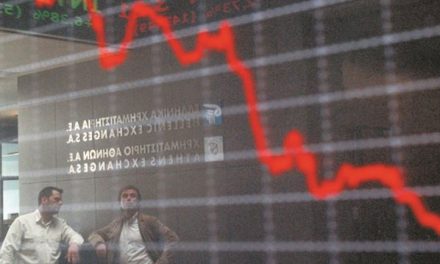Στην μακρά λίστα των αρνητικών δημοσιευμάτων των τελευταίων ημερών για την πορεία της ελληνικής οικονομίας έρχεται να προστεθεί και ο Economist με την στήλη του Buttonwood. Ένα ακόμα στα πολλά δημοσιεύματα στον μακρύ κατάλογο με τα εφιαλτικά σενάρια και τα πολλά επικριτικά και ενίοτε και πικρόχολα σχόλια των τελευταίων ημερών αντικατοπτρίζουν το πολύ αρνητικό κλίμα σε βάρος της χώρας μας. Ο Buttonwood, επικαλούμενος το σημερινό δημοσίευμα του Martin Wolf των FT που σημειώνει ότι «έχει περάσει ένας χρόνος από το πακέτο διάσωσης της ελληνικής οικονομίας και το πρόβλημα δεν έχει λυθεί», προχωρά ακόμα πιο πέρα. Χθες Τρίτη παρακολούθησε το συνέδριο του Economist στο Λονδίνο, όπου, όπως χαρακτηριστικά αναφέρει, ιστορικοί (Niall Ferguson), οικονομολόγοι (Glenn Hubbard) και τραπεζίτες (Sir Win Bischoff) συμφώνησαν στο εξής:
Η Ελλάδα δεν έχει καμία ελπίδα να αποπληρώσει μόνη το χρέος της. Η μόνη εναλλακτική είναι η ευρωζώνη να προχωρήσει προς μια πέρα από νομισματική σε δημοσιονομική ένωση, κάτι που ωστόσο θα ήταν ιδιαίτερα δύσκολο, εξαιτίας της Γαλλίας και της Γερμανίας. Για τον Buttonwood «Δυστυχώς, η Ελλάδα βρίσκεται σε απελπιστική κατάσταση», κρίνοντας ότι αν έφευγε από την ζώνη του ευρώ θα έλυνε το πρόβλημα της ανταγωνιστικότητας», υπογραμμίζοντας ωστόσο την άποψη ενός ομιλητή στο συνέδριο ότι υπάρχουν μεγάλες ελληνικές βιομηχανίες, από τις οποίες θα μπορούσε να επωφεληθεί. Η έξοδος από το ευρώ σημαίνει πτώχευση. Ο Buttonwood προβλέπει ότι κάτι τέτοιο θα προκαλέσει οικονομική κρίση, αφού οι Έλληνες θα μεταφέρουν τα ευρώ τους από τις ελληνικές σε ξένες τράπεζες (θα ήταν ενδιαφέρον να δούμε αν αυτό συμβαίνει ήδη). Η πτώχευση θα αφήσει την Ελλάδα εκτός αγορών, ενώ με μια πιθανή έξοδο από τη ζώνη του ευρώ, μπορεί να σημαίνει και απώλεια της επίσημης στήριξης της ΕΕ.
Διαβάστε όλο το άρθρο του Buttonwood.
A FEW weeks ago, my column was on debt denial. There could not be a clearer case of it today than in remarks by Christine Lagarde, the French finance minister, to Le Figaro about a potential Greek restructuring.We totally exclude it in any form. Nor is there any question of Greece leaving the Eurozone. I want to reassure investors.Of course, one recognizes that politicians may feel they have to say this sort of thing. Jim Callaghan, Britain’s finance minister in 1967, made the mistake of prevaricating (rather than lying) ahead of sterling’s devaluation that year, provoking a further run on the country’s foreign exchange reserves. But as Martin Wolf argues in today’s FT, it has been a year since the Greek bailout and the problem has not been solved; yields are higher than ever, and private sector investors now face a bigger loss since they have been subordinated to official creditors.Your blogger spent all of Tuesday chairing the Economist’s bellwether conference in London which featured historians (Niall Ferguson), economists (Glenn Hubbard) and bankers (Sir Win Bischoff). It was generally agreed that Greece had no hope of repaying its debts on its own and that the only alternative would be a push to fiscal union across the euro-zone. But that would be staggeringly unpopular with the German electorate which would have to foot most of the bill, and one doubts that Christine Lagarde could sell it to French voters either.Alas, Greece is in a hopeless position. Leaving the euro would solve the competitiveness problem but as one speaker put it, Greece has no great industries that could take advantage. And euro departure would lead to inevitable default in any case, since its debts are denominated in euro terms. It would cause a financial crisis as Greeks took their euros out of domestic banks and stashed them overseas (it would be interesting to see whether this is happening already). Default would cut the Greeks off from the markets, requiring the country to balance its budgets meaning they would still have to impose an austerity programme. And euro departure might also cut the country off from official support from the EU.Default within the euro would still leave the economy dependent on its neighbours but at least the Germans and the ECB would have a more secure claim since private sector claims would be heavily discounted. But the problem is what to do about the Greek banks that own government debt; they would need rescuing as well. Of course, the reason Ms Lagarde is so wary of Greek default is that it might prompt a further run on Ireland, Portugal and (worst of all) Spain.Muddling through and hoping for the best is the strategy but it ain’t going to work. The Greeks won’t wear it (there’s another national strike today); the markets won’t wear it (three year Greek bond yields are nearly 25%); and German voters won’t wear it either.



















